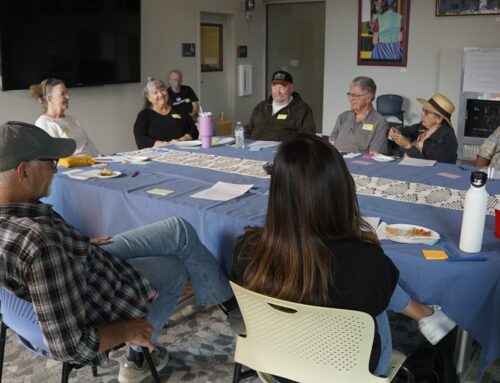Santa Cruz Local offers its stories on local public institutions free as a public service. We want everyone to be informed about what happens in local government. It makes our community stronger.
Santa Cruz Local depends on memberships from people like you to make sure vital information can be available to all. Can we count on your help?
SANTA CRUZ >> Santa Cruz residents spoke out against police violence, the militarization of police departments and racial bias in the criminal justice system during a city-sponsored virtual forum Wednesday.
The meeting was hosted on Zoom by Santa Cruz Mayor Justin Cummings and Santa Cruz Police Chief Andy Mills.
Several residents said police in Santa Cruz unfairly target black people and other people of color, acquire military equipment and participate in regional protests where police brutality occurs.
“I am an African American and I got pulled over for riding a bicycle,” said Shaka Kamoi, one of the many callers. He recounted an experience he had while biking in the city. “I have no record and I am an Iraq veteran.”
Kamoi said he wanted to accuse the officer who stopped him of profiling but doubted his complaints would be taken seriously.
Police Chief Andy Mills said all complaints about officers are referred to internal affairs. Mills said when one officer receives several complaints, he notices. However, later in the meeting, when another resident asked whether the city council or city manager could remove an officer from the department, Mills said chiefs are often at a disadvantage against powerful police unions.
“If you want the chiefs to clean it up, you have to give them the tools to do it,” Mills said.

Many residents were critical of the police’s mutual aid agreements with other police agencies like the university police and the Oakland Police Department.
Clara Burros said she was at an Oakland protest where police fired rubber bullets and tear gas into the crowd and she saw Santa Cruz Police Department officers with other agencies.
Mills said he has a policy to send a superior officer to ensure officers are not embroiled in protest management.
“If we are going, it is to restore order after a riot, not help manage a peaceful protest,” he said.
Mills said his officers helped with traffic management during the recent UC Santa Cruz grad student strikes.
Callers also expressed frustration with the military equipment used by police across the country and in Santa Cruz.
“I oppose the militarization of the SCPD, including the BearCat,” said Santa Cruz resident Tom Donohue, referring to the department’s armored vehicle. “This equipment alienates the police from the community and destroys our trust in you.”
The department’s acquisition of the BearCat was controversial in 2015 when the nation was still roiled by a wave of protests related to the killing of Michael Brown, an unarmed black man, by a police officer and the militarized police response to ensuing protests.
The BearCat is a military attack-style vehicle that the police department said they needed to keep officers safe in violent confrontations with dangerous criminals. Many critics said the vehicle was superfluous and indicative of an us-versus-them mentality between law enforcement and the communities they patrol.
Other participants asked whether a requirement for officers to live in Santa Cruz could help foment a more community-based policing style.
Not everyone who called was as reform-minded as the majority of speakers.
One resident said he was supportive of the police, said the protests that have ended in destruction have hurt the cause against police violence and asked why there isn’t the same level of outcry when white people are killed by police.
Mills and Cummings answered nearly all the questions and promised reform.
Mills said as of Wednesday, the department will no longer allow officers to use a chokehold restraint, following the lead of the San Diego Police Department.
“It’s done, it’s gone,” he said. “No officer will use it in Santa Cruz again.”
Mills also spoke about the police department’s de-escalation training, and said the department avoided five situations where lethal force was warranted in the past year. He said his officers receive training about implicit bias and said his department ignores calls about black people engaged in innocuous activities.
Mayor Cummings, who is black, spoke about Americans’ anger about the lack of accountability police enjoy as they appear to commit egregious violent acts with impunity.
“We are here because the rate at which black people are killed by police is nearly twice as high as the rate at which white people are killed,” he said.
Cummings also said the council will consider the restriction of some police surveillance techniques and technologies such as facial recognition.
Cummings and Mills made national and even international news this weekend as they knelt together at a protest in downtown Santa Cruz Saturday in a show of solidarity with demonstrators.
Some callers expressed appreciation for the gesture but said reform must be more than symbolic.
“A show of solidarity isn’t enough,” said Matt Simon. “It’s about speaking with police unions to make sure police officers are held accountable.”
Matthew Renda is a freelance writer who has garnered multiple awards for his reporting. His work has appeared in the Santa Cruz Sentinel, the Mercury News, CNET, CBS News, The Atlantic and Outside Magazine. He lives in Watsonville with his wife, Jessica, and their two children.





